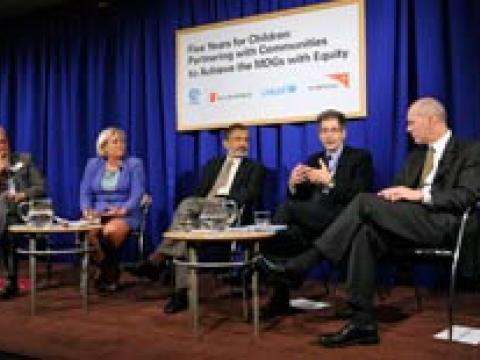Scoring goals for the poorest children

This morning, Tuesday, World Vision co-hosted a side event during the United Nations General Assembly week, focusing on the Millenium Development Goal review.
It was our way of making sure the needs of children are reflected early in the week's deliberations. We wanted to help to ensure that the technical and political discussions which follow remain focused on the most vulnerable people in our societies. Around 200 people turned up for the event, including government ministers, senior officials from the UN and NGOs, expert researchers and others.
I spoke about the need for the world to focus on families and communities as the vital - and often missing - link in ensuring that the world's interventions actually reach the poorest children.
Too often, new global investments in health, education and social care for children are directed toward areas that are easier to reach. A country may then appear to improve, in terms of the number of children surviving, or receiving education. But within that country a population may be falling behind, or girls may be doing worse than boys. World Vision's experience is that the greatest impact from our investment in equitably reaching all children comes through community ownership and involvement.
If those who care about the Millenium Development Goals really want to bring the biggest impact for children, we must all increasingly adopt this focus - go where there is least provision for children, and encourage their families and communities to care for and protect their own children. Couple that with national level advocacy for better provision of services to back up that local care, and the MDGs look achievable where, currently, we are falling behind.
Unicef's Deputy Executive Director Saad Houry and Save the Children Sweden's Secretary General Elisabeth Dahlin presented the results of their recent research that adds yet more support for this argument. The message was reinforced by Plan International's Chief Executive Officer Nigel Chapman and community mobilisation specialist Dr Ahbay Bang. All the organisations emphasised the need for us to work together more closely.